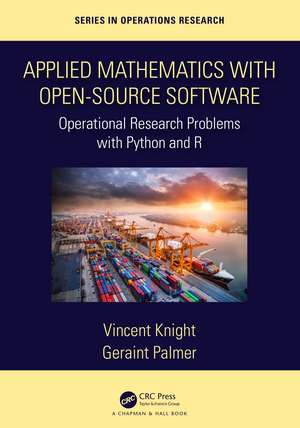Applied Mathematics with Open-Source Software: Operational Research Problems with Python and R: Chapman & Hall/CRC Series in Operations Research
Autor Vincent Knight, Geraint Palmeren Limba Engleză Paperback – 27 mai 2022
| Toate formatele și edițiile | Preț | Express |
|---|---|---|
| Paperback (1) | 367.13 lei 6-8 săpt. | |
| CRC Press – 27 mai 2022 | 367.13 lei 6-8 săpt. | |
| Hardback (1) | 783.79 lei 6-8 săpt. | |
| CRC Press – 27 mai 2022 | 783.79 lei 6-8 săpt. |
Preț: 367.13 lei
Preț vechi: 458.91 lei
-20% Nou
70.25€ • 73.61$ • 58.07£
Carte tipărită la comandă
Livrare economică 12-26 aprilie
Specificații
ISBN-10: 0367339986
Pagini: 152
Ilustrații: 18 Line drawings, black and white; 18 Illustrations, black and white
Dimensiuni: 178 x 254 x 10 mm
Greutate: 0.28 kg
Ediția:1
Editura: CRC Press
Colecția Chapman and Hall/CRC
Seria Chapman & Hall/CRC Series in Operations Research
Cuprins
Section I. Getting Started. 1. Introduction. 1.1. Who is This Book For? 1.2. What do We Mean by Applied Mathematics? 1.3. What is Open-Source Software. 1.4. How to Get the Most Out of this Book. 1.5. How Code is Written in this Book. Section II. Probabilistic Modelling. 2. Markov Chains. 2.1. Problem. 2.2. Theory. 2.3. Solving with Python. 2.4. Solving with R. 2.5. Wider Context. 3.Discrete Event Simulation. 3.1. Problem. 3.2. Theory. 3.3. Solving with Python. 3.4. Solving with R. 3.5. Wider Context. Section III. Dynamical Systems. 4. Differential Equations. 4.1. Problem. 4.2. Theory. 4.3. Solving with Python. 4.4. Solving with R. 4.5. Wider Context. Chapter 5. Systems Dynamics. 5.1. Problem. 5.2. Theory. 5.3. Solving with Python. 5.4. Solving with R. 5.5. Wider Context. Section IV. Emergent Behaviour. 6. Game Theory. 6.1. Problem. 6.2. Theory. 6.3. Solving with Python. 6.4. Solving with R. 6.5. Wider Context. 7. Agent Based Simulation. 7.1. Problem. 7.2. Theory. 7.3. Solving with Python. 7.4. Solving with R. 7.5. Wider Context. Section V. Optimisation. 8. Linear Programming. 8.1. Problem. 8.2. Theory. 8.3. Solving with Python. 8.4. Solving with R. 8.5. Wider Context. 9. Heuristics. 9.1. Problem. 9.2. Theory. 9.3. Solving with Python. 9.4. Solving with R. 9.5. Wider Context.
Notă biografică
Vince Knight is a Senior Lecturer at Cardiff University in the School of Mathematics. His research interests are in emergent behaviour, probabilistic modelling, applications in healthcare and pedagogy. He maintains a number of open-source research software projects, is a trustee of the UK Python association, is an editor for the Journal of Open-Source Software, was awarded the 2017 John Pinner award for contribution to the Python community and is a fellow of the Sustainable Software Institute. He regularly wins awards for his teaching in the School of Mathematics. He does not only speak at conferences around the world but continues to organise conferences to bring the power of open-source software to as many people as possible.
Geraint Palmer is a Welsh Medium Lecturer at Cardiff University in the School of Mathematics. He is a member of the operational research group where his research interests are in simulation and probabilistic modelling, in particular applying these to model public services such as healthcare systems. He uses open-source software in all aspects of his research: he is a maintainer of Ciw, an open-source Python library for discrete event simulation, and won the OR Society's Doctoral Award in 2018. Geraint is also a fellow of the Software Sustainability Institute and has presented at a number of international conferences on the subject of best practice of scientific computing, and regularly teaches programming and runs coding workshops for people of all ages.
Recenzii
– Sally McClean FRSS, Ulster University, United Kingdom
"What an exciting contribution to Open Science and mathematics from Knight and Palmer. Essential reading for all Operational Researchers who wish to use Free and Open-Source Software and share their models with others."
– Thomas Monks, University of Exeter, United Kingdom
"This book is targeted towards a wide range of readers including students with interest in applied mathematics, operational research and related disciplines, programmers, or just hobbyist who like to solve maths problems. This book covers problems on various topics including Markov Chains, Discrete Event simulation, Differential Equations, Game Theory, Systems Dynamics, Agent-based simulation, Linear Programming, and Heuristics. There is something for everybody’s taste! The programming codes are available in both Python and open-source software package R and the codes are easy to follow and understand."
– Sanja Petrovic, Nottingham University Business School, United Kingdom









